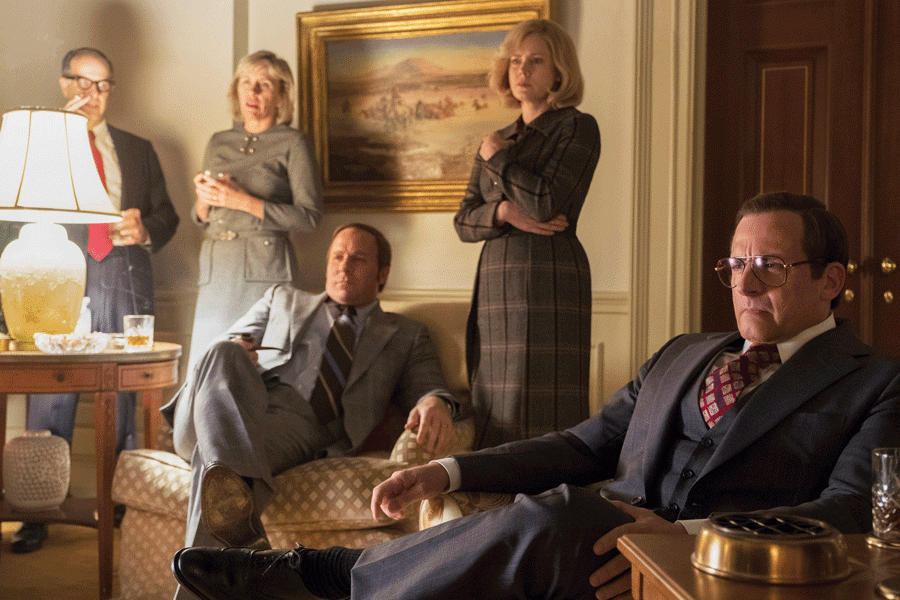Adam McKay brings stylistic flair to modern history in Dick Cheney biopic
The cast of Adam McKay’s “Vice,” which chronicles the life of former Vice President Dick Cheney.
February 13, 2019
The term “biopic” conjures up ideas of stuffy narration, clunky reenactments and a dry approach to history. Most importantly, it implies removed objectivity and undeniable fact.
“Vice” — the 2018 comedy-drama about former vice president Dick Cheney — throws all those notions out the window. The movie is a fast-paced romp through Cheney’s life and his rise to power as a singularly influential vice president under George W. Bush. It doesn’t shy away from spinning history with perspective, flair and a healthy serving of overt criticism. And it doesn’t even claim to be a fully accurate recounting, acknowledging that it’s hard to get into the head of one of the most notoriously secretive government figures in recent history.
When it comes to the facts, “we did our f—ing best,” a pre-film caption proclaims.
The film is now up for Best Picture at the Academy Awards, and deservedly so. It uses fun, risk-taking storytelling to take on a complex subject and make it feel deeply relevant to the modern viewer. As audience members, we get wrapped up in both the personal tensions and the political schemings of a protagonist who stealthily shaped the world we live in today.
Christian Bale disappears into his lead role as the movie’s antihero, adopting 40 extra pounds, a new prosthetic-based face and a low, vaguely Midwestern growl of a voice for the transformation. The supporting cast also shines: Amy Adams, in a choppy mom bob, blends shrewd calculation and traditional wifely supportiveness as Lynne Cheney, while Sam Rockwell has fun as a charismatic but oblivious George W. Bush. (Bale, Adams and Rockwell are all nominated for acting awards at the Oscars.) Steve Carell gets to play to his strengths as a brash and sometimes insensitive Donald Rumsfeld, Cheney’s mentor at the beginning of his tenure in Congress.
Director Adam McKay uses a lot of the stylistic flourishes audiences might recognize from his 2015 film “The Big Short” (also a Best Picture nominee). Montages of archival media footage build up the atmosphere of the early-2000s setting and ground the film’s glossy reenactments in raw, undeniable reality. Cheeky meta moments break the fourth wall to explain policy to audiences through the mouths of waiters, politicians and a mystery narrator, whose unknown identity adds some suspense to a film with a main plot that is largely Google-able. The entire movie has a sense of fun about it, like McKay is winking at audience members — whom he assumes will be in-the-know about U.S. politics as well as alternative film tropes.
It’s not all tongue-in-cheek, though; McKay and his team make sure to constantly emphasize the real and lasting implications of these seemingly dry political decisions. Jump cuts link a handshake in D.C. with a village being bombed in Cambodia, or a memo draft with prisoners being tortured in Guantanamo Bay. They show how Cheney’s journey from small-town Nebraska to the White House has effects that stretch to all corners of the world — and they feel completely, upsettingly relevant today.
The cinematography and score also serve to underscore potentially mundane actions with an almost exaggerated sense of drama. Close-up shots and high-contrast lighting heighten what is essentially a few men running around a few D.C. buildings to a scale that feels epic, and Nicholas Britell’s brass-heavy soundtrack further elevates the action.
“Vice” is not a perfect film. It’s wild, and engaging and ambitious, but it’s also messy, playing a little fast and loose with the truth and leaving some character motives feeling fuzzy. Maybe the film bites off more than it can chew in the end. Still, the fearlessness with which it takes risks — both stylistic and political — deserves to be recognized.
Email: mburakoff@u.northwestern.edu
Twitter: @madsburk


